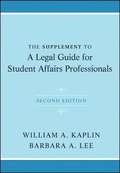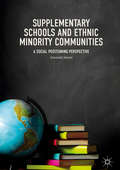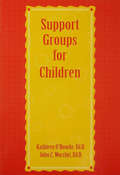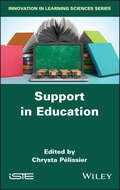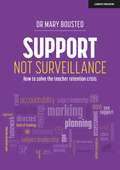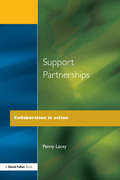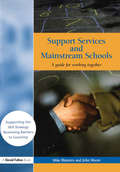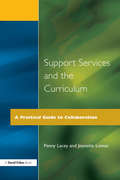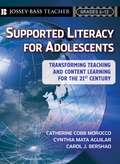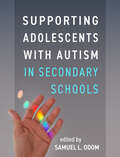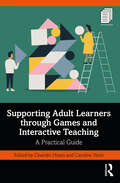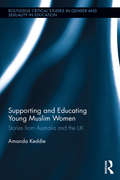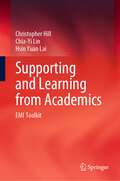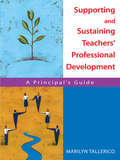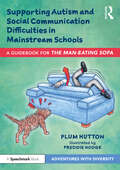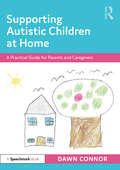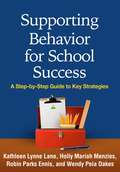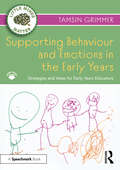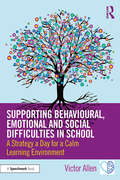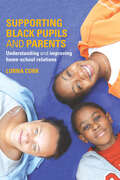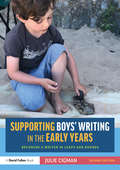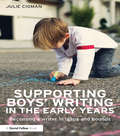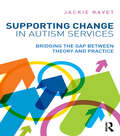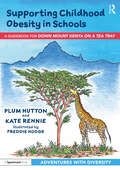- Table View
- List View
The Supplement to A Legal Guide for Student Affairs Professionals
by Barbara A. Lee William A. KaplinBased on the latest rulings, court cases, and legal actions that bear on the conduct of higher education, this student affairs supplement provides updated information regarding current rulings and recent cases for student affairs practitioners and graduate students in student affairs administration courses.Designed specifically for practitioners, this suppliment is the most updated and easy-to-use volume for student affairs officers and students.Topics include the latest updates on:Higher Education Opportunity Actlitigation involving online courses or programsnew cases involving students with disabilitiesnew federal rules about federal student loan programsnew developments in student disciplinestudent suicidesearching residence hallscampus security issues
Supplementary Schools and Ethnic Minority Communities: A Social Positioning Perspective
by Amanda SimonThis book provides a unique perspective into the world of supplementary schooling, exploring both the social positioning of these schools and the ethnic minority communities they serve. The author presents a close examination of the establishment and functioning of supplementary schools which offers a fresh and novel insight into acculturation processes. Drawing on empirical data gathered from staff interviews, classroom observations and interactive recordings, this book explores the operation of supplementary schools as sites of identity construction where the community identities are preserved, defended, renegotiated and reconstructed. The various modes of construction are indicative of the acculturation experiences of ethnic minority communities and the ways in which these communities negotiate residence in one country whilst having roots in another. This book therefore offers a revealing conceptualization of supplementary schools, not merely as educational spaces, but socio-political enterprises that are situated within and respond to various historical, social and political contexts. This pioneering work will appeal to students and scholars in the fields of education, migration and identity.
Support Groups For Children
by Kathleen O'Rourke John C. WorzbytDesigned for use with children in grades K-6, this book provides a review of support groups: their nature and value; the tripartite model of children's needs, behaviours they need to learn and environmental conditions that support learning; the Keystone Learning Model, which encompasses the tripartite model, strengths and decision-making; and 'nuts and bolts' suggestions for creating and managing child support groups. The book also addresses various support groups chapter by chapter and homework ideas are provided with each chapter.
Support in Education
by Chrysta PélissierThis book aims to reflect the contours of the notion of aid as it is questioned by current scientific research. This notion appears as fuzzy in its scope of intervention, in its methods of multidisciplinary and multi-referential approaches in theoretical frameworks convened. Present in different areas that we propose to investigate in the book (training and teaching at university, inclusion in education, but also prevention, the fight against failure in orientation), the notion of help questions research in SHS and Computer Science. It comes in different formats labeled "help" but also "support", "support" or "guidance". In order to take stock of these notions and to question their differences, we convoke several authors (French and foreign) who participate by their research (-action) underlining components and environmental factors of the device that give this notion any its thickness.
Support Not Surveillance: How to solve the teacher retention crisis
by Mary BoustedWhy are so many teachers leaving the profession increasingly early in their careers? What harm is being done to pupils' educational prospects by persistent teacher shortages? Why are teachers held uniquely responsible for the effects of poverty on children’s progress and attainment? What are the unintended consequences of rushed government education policy-making? And what can be done about all of the above?Supported by the latest international and national evidence, Support Not Surveillance seeks to address these important questions. Laying bare how the inadequacy of Westminster policies is compounded by an unfair Ofsted inspection regime, Dr Mary Bousted draws on her years of expertise and access to decision-makers to expose the gap between ministerial rhetoric and the daily reality encountered by teachers in their classrooms across England.Ending on a set of proposals to move beyond the seemingly perennial crisis in teacher recruitment and retention, Support Not Surveillance is an unflinching call to end the failed experiment of government interventionism in classrooms.
Support Not Surveillance: How to solve the teacher retention crisis
by Mary BoustedWhy are so many teachers leaving the profession increasingly early in their careers? What harm is being done to pupils' educational prospects by persistent teacher shortages? Why are teachers held uniquely responsible for the effects of poverty on children’s progress and attainment? What are the unintended consequences of rushed government education policy-making? And what can be done about all of the above?Supported by the latest international and national evidence, Support Not Surveillance seeks to address these important questions. Laying bare how the inadequacy of Westminster policies is compounded by an unfair Ofsted inspection regime, Dr Mary Bousted draws on her years of expertise and access to decision-makers to expose the gap between ministerial rhetoric and the daily reality encountered by teachers in their classrooms across England.Ending on a set of proposals to move beyond the seemingly perennial crisis in teacher recruitment and retention, Support Not Surveillance is an unflinching call to end the failed experiment of government interventionism in classrooms.
Support Partnerships: Collaboration in Action
by Penny LaceyThe challenges and possibilities for collaborative support partnerships across the range of special needs are thoroughly explored in this practical book based on current research. Case studies are used to illustrate practice that is achievable yet forward thinking drawn from a variety of services and age phases. This book gives guidance for the sharing of practice, and advice for those wishing to embark upon or improve the way in which they work with other people and services.
Support Services and Mainstream Schools: A Guide for Working Together
by John Moore Mike BlamiresFirst Published in 2005. Routledge is an imprint of Taylor & Francis, an informa company.
Support Services and the Curriculum: A Practical Guide to Collaboration
by Penny Lacey Jeanette LomasFirst Published in 1993. Routledge is an imprint of Taylor & Francis, an informa company.
Supported Literacy for Adolescents: Transforming Teaching and Content Learning for the 21st Century
by Catherine Cobb Morocco Cynthia Mata-Aguilar Carol J. BershadSupported Literacy for Adolescents, written by nationally recognized experts, introduces an innovative and field-tested instructional framework for preparing secondary students to succeed academically in a fast-changing and globally networked world.<P><P> Filled with examples from science, history, literature, and special education classrooms, the book shows how teachers can enable diverse students, including under-performers, to develop critical thinking and other essential competencies along with the "multi-literacy" tools needed to engage in twenty-first century content learning.
Supporting Adolescents with Autism in Secondary Schools
by Samuel L. OdomIn a convenient large-size format, this book presents the first research-based, comprehensive program designed to support high school students with autism spectrum disorder (ASD). Developed and tested in public schools by the Center on Secondary Education for Students with Autism Spectrum Disorder (CSESA), the program addresses four critical areas--literacy, social competence and peer relationships, independence, and postschool transition preparation for students and their families. Chapters provide a roadmap for implementation of each component, complete with intervention guidelines, case vignettes, key findings, lessons learned, and reproducible forms that can be downloaded and printed at the companion website. The book also helps readers navigate the wealth of additional resources freely available from CSESA.
Supporting Adult Learners through Games and Interactive Teaching: A Practical Guide
by Chandni Hirani Caroline VarinGames-based teaching offers an engaging way for students and adult learners to interact with concepts and build their problem-solving and communication skills. This exciting book will help educators integrate games into their classes and shows how this method of teaching improves motivation, as well as diversifies and solidifies learners’ skill sets. Bringing together expert contributors from the Professors Without Borders’ global network who have effectively used interactive games-based approaches in their teaching, the book features 13 unique games that teach a wide variety of skills across a range of difficulty levels. The chapters highlight the skills of strategy, decision-making, communication, teamwork, problem-solving, reflective thinking and empathy being used by participants alongside the pedagogical principles that underpin each game. Suitable for online and in-person teaching, this book will be valuable reading for educators working with student and adult learners looking to adopt innovative and interactive teaching methods, as well as those interested in learning about how game-based teaching can improve vital skills.
Supporting and Educating Young Muslim Women: Stories from Australia and the UK (Routledge Critical Studies in Gender and Sexuality in Education)
by Amanda KeddieThis book draws on the stories of female educators and young Muslim women to explore issues of identity, justice and education. Situated against a backdrop of unprecedented Islamophobia and new articulations of ‘White-lash’, this book draws on case study research conducted over a ten-year period and provides insight into the diverse worlds of young Muslim women from education and community contexts in Australia and England. Keddie discusses the ways in which these young women find spaces of agency and empowerment within these contexts and how their passionate and committed educators support them in this endeavour. Useful for researchers and educators who are concerned about Islamophobia and its devastating impacts on Muslim women and girls, this book positions responsibility for changing the oppressions of Islamophobia and gendered Islamophobia with all of us. Such change begins with education. The stories in this book hope to contribute to the change process.
Supporting and Learning from Academics: EMI Toolkit
by Christopher Hill Chia-Yi Lin Hsin Yuan LaiThis book draws on real-world case studies to highlight key challenges and support the crafting of relevant and contextual responses. There is increasing pressure on academics and teaching staff to provide high-quality teaching and delivery in English. More than an edited volume, it offers a true dialogue on emerging trends in EMI, making it of considerable value to practitioners, students and policymakers alike. By analyzing established and emerging models of EMI delivery, the book presents a review and assessment of how universities can respond to student expectations and build internal capacities so as to offer better learning experiences.
Supporting and Sustaining Teachers' Professional Development: A Principal's Guide
by Dr Marilyn TallericoThis text specifically targets busy school principals who want practical suggestions grounded in national NSDC standards for balancing everyday administrative tasks while encouraging teachers' professional growth.
Supporting Autism and Social Communication Difficulties in Mainstream Schools: A Guidebook for ‘The Man-Eating Sofa’ (Adventures with Diversity)
by Plum HuttonThis guidebook is designed to be used alongside the storybook The Man-Eating Sofa (for 8-12 year-olds). Written in an engaging and accessible style, chapters explore the educational, social and psychological impact of autism and social communication and interaction difficulties (SCID). Strategies are provided to help parents and practitioners recognise and support these issues in the school environment. A chapter-by-chapter exploration of The Man-Eating Sofa provides an opportunity to generate discussion and facilitate understanding of autism and SCID amongst young people and adults who might not have considered the impact of social communication difficulties upon day-to-day life. Key features include: an accessible introduction to autism and SCID discussion points for use with The Man-Eating Sofa, to accompany young people’s reading of the story strategies are provided to support the education, mental health and wellbeing of young people who find social communication, interaction, sensory processing and emotional regulation challenging in mainstream educational settings. This is an essential resource to help parents, teachers and professionals understand and support pupils who are autistic as well as those who find social communication a challenge in the mainstream classroom.
Supporting Autistic Children at Home: A Practical Guide for Parents and Caregivers
by Dawn ConnorThis practical guide offers a wealth of advice to support parents and caregivers who have an autistic child within their family. It provides accessible and straightforward information on the topics that matter most, from initial questions around diagnosis, to providing the best home support. Chapters also debunk myths commonly held about autism and signpost appropriate support mechanisms, including ideas to help with sleep, diet, sensory sensitivities, social interactions, communication, and much more. The emphasis throughout is on offering practical strategies to give much-needed, meaningful support to the child’s main caregivers and other family members, in an easily digestible format. Written from the author’s joint perspective as a qualified teacher with an expertise in autism, and as a grandmother of an autistic grandchild, this book is an essential guide for parents and caregivers, created by someone who understands and appreciates what it is like to walk in their shoes.
Supporting Behavior For School Success: A Step-by-Step Guide To Key Strategies
by Kathleen Lane Holly Menzies Robin Ennis Wendy OakesDesigned for busy teachers and other school-based professionals, this book presents step-by-step guidelines for implementing seven highly effective strategies to improve classroom management and instructional delivery. These key low-intensity strategies are grounded in the principles of positive behavior intervention and support (PBIS), and are easy to integrate into routine teaching practice. Chapters discuss exactly how to use each strategy to decrease disruptive behavior and enhance student engagement and achievement. Checklists for success are provided, together with concise reviews of the evidence base and ways to measure outcomes. Illustrative case examples span the full K-12 grade range. Reproducible intervention tools can be downloaded and printed in a convenient 8 1/2" x 11" size. See also Managing Challenging Behaviors in Schools, by Kathleen Lynn Lane et al., which shows how these key strategies fit into a broader framework of prevention and intervention.
Supporting Behaviour and Emotions in the Early Years: Strategies and Ideas for Early Years Educators (Little Minds Matter)
by Tamsin GrimmerHave you ever wondered why children behave the way they do or why they can become overwhelmed with emotions so quickly? This practical resource has been created to help educators effectively support their children’s behaviour and better understand their emotions. The book focuses on the idea that all behaviour is a form of communication and explores central areas such as self-regulation and attachment, offering strategies that can be used to support challenging behaviour. Each chapter includes examples of practice, reflective questions and an activity for the reader to help consolidate their learning and encourage them to become ‘behaviour detectives’. Key topics discussed include: • Attachment theory, adverse childhood experiences and the importance of feeling safe and secure in the home and setting. • Characteristics of children during conflict situations or moments of challenging behaviour. • Developmentally appropriate expectations for children, and why it is vital that expectations are realistic. • Emotion coaching and the significance of acknowledging and validating feelings. • Linking behaviour with schematic play. Written from first-hand experience and filled with practical advice as well as recommendations for further reading and resources, Supporting Behaviour and Emotions in the Early Years is an essential read for early years educators.
Supporting Behavioural, Emotional and Social Difficulties in School: A Strategy a Day for a Calm Learning Environment
by Victor AllenTeachers need to be equipped not only to teach, but also to help build mental security and wellbeing into the lives of young people and children. Supporting Behavioural, Emotional and Social Difficulties in School provides practical, relevant and proven strategies and constructive advice in order to guide teachers in this endeavour, helping them to both understand and overcome the difficulties and generational changes faced by young people and children. Containing information on topics such as classroom strategies for common issues; first impressions; and how to deal with adults, leadership and tasks such as school trips, this volume presents tried and tested strategies and shares the author’s knowledge when it comes to working in all types of schools, including primary, secondary, and pupil referral units. Not only exploring the strategies, this book also examines the reasons why a situation has arisen, and, for each piece of advice, offers an explanation for why it will work and how it affects our sense of coherence. The book also includes a short introduction to brain development at various ages, exploring the implications for children as they grow and mature, as well as examining how teachers can work with and help children through these developmental stages, assisting teachers in understanding the factors to be aware of when helping students and children develop mental security. Consolidating an understanding of mental and emotional health issues within children and young people, knowledge about cognitive brain development, and advice on what teachers can do in their classroom to make a difference, this book is essential reading for all teachers.
Supporting Black Pupils and Parents: Understanding and Improving Home-school Relations
by Lorna CorkDrawing on her extensive teaching experience, Lorna Cork explores the day-to-day needs and expectations of black parents and their children in education. Exclusion rates of black children in the UK and around the world continue to rise, highlighting that something is very wrong with the way their teaching and learning is supported in today’s schools. Focusing on contemporary situations and using real-life case studies, Cork emphasises the human consequences of the true issues behind the statistics. This topical text offers a detailed look at five key organisations that exist to support black parents. It examines their home-school interventions and discusses the central issues arising out of their efforts. The fascinating evidence offers fresh perspectives and provides much needed advice and guidance to all those seeking to improve co-operation between black families, schools and communities - all who share the goal of supporting the learning and attainment of the black child. Any education professional, student teacher, staff at an LEA, and anyone with a serious interest in race issues is sure to find this essential reading.
Supporting Boys’ Writing in the Early Years: Becoming a Writer In Leaps and Bounds
by Julie CigmanThis second edition of Supporting Boys’ Writing in the Early Years shows how you can help boys to become confident and capable writers by supporting them to write in ways that make sense to them – on the move, outside and inside, in dens, in bushes, in mud, or sprawled on the floor dressed as superheroes. The book reveals that a playful, child-centred approach can allow boys and girls to develop a writers’ voice, raise attainment in writing and enhance all aspects of young children’s development. This new edition includes: brand new examples, case studies and photographs from over 200 recent early writing projects; up-to-date references fully in line with the latest Early Years Foundation Stage (EYFS) documentation; a response to the increased focus in schools on handwriting, in particular on cursive handwriting; a questioning of the place of objective-led print in the classroom and a recommendation that environmental print should reflect learning rather than teaching; imaginative ideas for developing oral and written storytelling; a consideration of some of the ways in which challenging active play, such as superhero and weapon play, can be channelled into playful writing; a greater discussion and challenging of the emphasis placed on outcomes, over the process of learning and development. Supporting Boys' Writing in the Early Years will help you to create a truly enabling environment for writing and supports the belief that writing experiences should be EPIC: Everywhere, Playful and Purposeful, Inspirational and Contextualised. It is an essential read for all practitioners who want the children in their setting to flourish as motivated and creative writers.
Supporting Boys' Writing in the Early Years: Becoming a writer in leaps and bounds
by Julie CigmanJulie Cigman uses a vast range of personal vignettes to explain best practice when encouraging boys to write. The theory is brought to life with these recollections, making this a very informative and enjoyable book to read. The ideas for working together with boys are beautifully simple and are tried and tested. This book would support both experienced practitioners and those who are just starting out, because it is so accessible and uses examples in such a delightful way - Kathy Brodie, Early Years Consultant, UKEarly Years Consultant, UK. Julie Cigman has given us a practical and principled way forward in supporting boys' writing. This book is shot through with rich examples of effective practice and deserves to be widely used. Young boys' writing is bought alive for us in these pages, and the groundedness in practice demonstrates how boys' achievement in writing can be appropriately supported from an early age. This is a book for everyone interested in promoting early literacy development. An excellent read and a practical compendium -Professor Cathy Nutbrown, School of Education, The University of Sheffield. How do we give young children a ‘writers’ voice’ and allow them to become creative and inspired writers? Supporting Boys’ Writing in the Early Years shows you how you can help boys to become confident and capable writers by supporting them to write in ways that make sense to them – on the move, outside and inside, in dens, in bushes, in mud, or sprawled on the floor dressed as superheroes. Drawing on four boys writing projects involving over 80 practitioners, the book reveals that a playful, child-centred approach can allow boys and girls to develop a writers’ voice and raise attainment in writing as well as enhancing all aspects of young children’s development. With a strong focus on observation-led assessment and planning, the book is full of practical ideas to improve the writing environment and provide writing opportunities that will be enjoyable and motivating for children. Featuring a wide range of case studies, it covers: the stages that children move through in learning to write; how you can change and develop your learning environments to give children inspiring resources and opportunities to write; helping children to find a purpose to write through their play; practical ways to create a partnership with parents that builds on their strengths as educators at home. This book will help you to create a truly enabling environment for writing and is essential reading for all those that want the children in their setting to become confident, motivated and creative writers.
Supporting Change in Autism Services: Bridging the gap between theory and practice
by Jackie RavetSupporting Change in Autism Services explores the theoretical and practical dimensions of improving service provision for children, young people and adults with autism. The core aim of the book is to identify and critically examine some of the key factors that either facilitate or inhibit the implementation of good autism practice at both practitioner level and workplace level. It shows practitioners and students how to successfully translate autism theory into practice across service contexts and showcases a range of practitioner case studies throughout the text in order to illustrate effective implementation.? Topics explored include: controversies and ambiguities in autism policy, theory and discourse; understanding autism in an inclusive context; enabling participation; making sense of behaviour; autism and interprofessionalism; strategic planning for autism friendly services; bridging the implementation gap. This book is essential reading for anyone interested in improving services for people with autism in the education, social care, health and voluntary sectors.
Supporting Childhood Obesity in Schools: A Guidebook for 'Down Mount Kenya on a Tea Tray' (Adventures with Diversity)
by Plum Hutton Kate RennieThis guidebook, designed to be used alongside the storybook Down Mount Kenya on a Tea Tray, has been created to inform readers about the physical, social and psychological impacts of childhood obesity. Created for busy parents, teachers and professionals, this book is founded upon recent research and written in an engaging and accessible style. Chapters explain the surprisingly complex causes of childhood obesity and highlight that children often have little control over the factors that may lead them to become obese. The physical and psychological consequences of obesity are explored and strategies suggested, ranging from individual and family support to changes that need to be made at a societal level to tackle this significant public health issue. Key features include: • an accessible guide to childhood obesity • chapter-by-chapter discussion points for use with Down Mount Kenya on a Tea Tray to encourage open and honest conversations about childhood obesity and its effects • strategies to support obese children and their families to sustain positive lifestyle changes. This is an essential resource for parents, teachers and other professionals looking to understand childhood obesity and support children aged 8–12.
